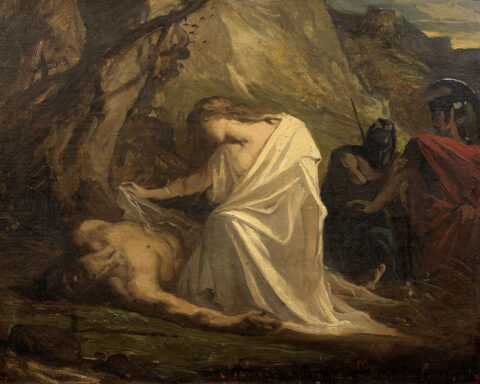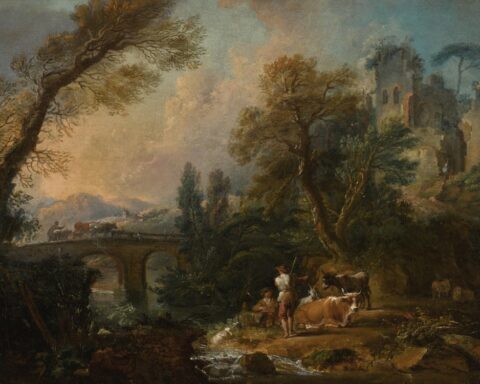I’d heard that my grandmother was failing. Twice a week my uncle took her from my mother’s house, where she’d been for the past two years, to a senior citizen center. My grandfather went to another center. It was best to keep them separated, for although they’d been married some eighty years, my grandmother had violent spells, knocking my grandfather’s teeth out with her cane, once, and belting several of the home nurses who helped with her care. My grandmother was afflicted with Alzheimer’s.
“What on earth does she do all day?” I asked my uncle. My grandmother was a Jehovah’s Witness. Growing up in her house, I had lived, eaten and breathed Jehovah. My grandmother was a fanatic. No blood transfusions, no saluting the flag, no holidays, and no pretty gifts tied up with ribbon.
“This,” said my uncle, lolling his head to one side and letting his tongue hang out. “What else can she do at nearly a hundred?”
I had flown in from out of state. There were things I wanted to tell her. Important things. I found her sitting against the wall in a chair, with her feet dangling inches from the floor. The left side of her cranium was distorted and swollen from the pressure of a tumor she’d elected not have removed. Instead, she’d gone to a health farm and fasted for forty-five days until the tumor receded. Years later, it grew back, blinding her in that eye.
Everyone in the room that late fall day was wearing a party hat. Everyone but my grandmother. Some of them wore Halloween costumes. My writer’s eye took it all in at a glance: my grandmother’s pink cotton dress, ironed and clean, the laces on her shoes, the emptiness in the eyes of the others, aluminum walkers and wheelchairs, the helplessness…. An involuntary shudder passed through me; so this was what we would all come to. I looked into my grandmother’s good eye to see if she had lost her senses.
My grandmother’s presence beamed brightly. “Satanika,” I said, teasing her in Greek, laughing and crying at the same time; I was so relieved. How ironic to have come this day, of all days, the Devil’s holiday. In the whole room, of twenty people or more, my grandmother and I were the only ones talking excitedly. I reached for her hand, beside myself to see her looking so well, a little fatter, perhaps, but that was to be expected as she’d become less mobile. “I see that they didn’t con you into wearing a hat and that you still have your right mind.”
“I never lose my right mind,” she answered in broken English. From somewhere came the scratchy sound of a record player. The group leader at the front of the room called one of the little old men with a rubber elephant’s nose over his own and invited him to dance. With each gentle step, the elastic holding the nose gave way. The nose was too heavy for its elastic. It was eerie. Not another single sound but my hysterical laughter.
“I’m so happy to see you,” I said, for maybe the fifth time. “I was so worried.”
“I’m glad to see you, too. But…. Who are you?”
The little old man was led to his seat, and a little old lady took his place, eagerly grasping the leader’s hands and swaying to the music. I was lost to my grandmother, like yesterday’s lunch. My uncle had prepared me for this, but still it came as a shock. “Don’t you remember beating me?” I asked, hoping to jog her memory. “Calling me names?”
“No,” she said, sweetly. “Sorry.” The tears…, the anger I’d carried for years…, gone…. It was hard to believe.
“Are you married?” she asked.
“I was but he was too stingy,” I said.
“Too bad,” said my grandmother, nodding in accord. After thirty-five years of bickering with me, my grandmother had become my ally against my mother, who had disowned me. There was not a single person in the family that my pain had not touched, but as far as my mother was concerned, at least, the breach was irreconcilable.
“And another thing,” I said, rubbing the place over my heart to relieve the tightness. “You were wrong about my being Polish. I found out that my other grandmother was Austrian.”
“Austrian?” She could not dispute it.
“Austrian gypsy and a princess to boot.” I was 99% certain that my grandmother had known all along. Had not only met my other grandmother, one Mary Bubelnik from a concentration camp for gypsies in Galitzia, but counted every tooth in my father’s rapscallion head. Between Alzheimer’s and my mother’s refusal to talk to me, I would never know, for sure.
“How are you doing?” she asked.
“Not too good. My hands fall asleep at night from poor circulation, plagued by the aches and pains of a woman twice my age.” Being disowned was killing me, inch by inch, a hard price to pay for finding my roots.
“What’s that from?”
“Smoking and too many problems.”
There had been problems in this family from the beginning. First, my mother married someone who wasn’t Greek and my grandparents disowned her. My uncle had a nervous breakdown just last year. My brother was up to 300 pounds, with a couple of nervous breakdowns of his own. Every meal during my adolescence was punctuated by the sound of my mother leaving a strip of rubber in the driveway. It was almost funny.
“What did you say your name was?” my grandmother asked.
My uncle told me she used to wait for him with a big needle on nights he stayed out late, after which he’d take her to Chinatown to eat to pacify her. My mother told me my grandmother caught her stealing a penny and ran a sewing needle into her palm to teach her a lesson. Once, she was stripped naked and locked out of the house! Grandmother had ruled our embattled family with an iron fist. My mother was still on speaking terms with my brother, but my uncle’s wife was not allowed in the house, which meant that my cousin Despina had come over to my camp. The interloper to this carnage was my mother’s new husband, Clarence: buck-toothed and beer bellied.
“You should know my daughter,” my grandmother said.
“I do know your daughter,” I answered. “Your daughter is my mother.”
My grandmother rolled the word “daughter” on her lips, wonderingly, patted my hand and said: “You’re going to be all right.”
“I hope so,” I said, giggling and drying my eyes. The group leader pushed a lady in a wheelchair to the front of the room, rolling it back and forth to the music. There was not a flicker of recognition in the woman’s eyes. A toothless old man wearing a giant plastic bow tie and a Martha Raye lip sticked-smeared mouth fluttered by. “Watch out,” I teased my grandmother, “that guy is going to ask you to dance.”
“I’m not crazy,” said my grandmother, shaking with laughter.
“Seriously,” I said. “How is Clarence treating you?” As my cousin, Despina said just before I left: “The one good thing about our grandmother, if she doesn’t like you, she’ll tell you to your face.” I wondered how Clarence’s ego was withstanding what I was sure was a constant stream of epithets.
“Clarence drinks,” said my grandmother. “The bum.”
My grandmother and I raked Clarence over the coals, gaining perverse pleasure in knowing that everyone within hearing distance would now know Clarence’s true colors. What a sight we must have been, back-slapping guffaws, giggling like kindergartners, bonded forever by our mutual disrespect for the woman who chose marriage to Clarence rather than sleep alone!
The leader in the front of the room lined up the best of the costumed participants for judging. A little old lady in a geisha costume was the hands-down favorite. Feeble clapping duly recorded by the judges. My grandmother’s hands were clasped in front of her, encircling her girth. “I got fat,” she said, apologetically.
“Me too,” I admitted. “But I think my head is on straight.” Sometimes it was hard to tell about me. My grandmother had suddenly become very dear to me and I didn’t know how I was going to leave her. “I love you,” I said, “even if you don’t know who I am.”
“I’m so glad to see you,” she said, radiating love.
“Your other granddaughter, Despina, is beautiful,” I said.
My grandmother’s eyes lit up. I’ve touched upon her vanity, I thought, the last thing that goes. The family album is full of my grandmother wearing monstrous hats, in defiant poses, hand usually on her hip and making a face that would sink a battleship. “You mean, Despina, my son’s daughter?”
“She has two beautiful children and is expecting another.”
“And her husband?”
“Turned out not to be a bad guy,” I said. “Even helps her with the kids.”
“I’m glad.”
I don’t want to bring sorrow to my grandmother but my kid brother is not okay. In his last letter to me, he blamed my grandmother for his faults, for the family that was never a family, the way we’d both wanted. Until they moved in with my mother, my grandfather sat in the same chair for twenty-five years waiting to die. Depression has riddled our family like idiots run in some, but my brother refused to get medication like my uncle and myself. “Soft control,” my grandmother called it.
“By the way,” I said, changing the subject. “My father died last year. He had nothing but good things to say about you.”
“He wasn’t Greek,” my grandmother said, remembering.
“He wasn’t all bad, either,” I said. My mother would never forgive me for looking him up. He’d run out on a child support order of five dollars a week. Before he died, however, my father’s love for me had been unconditional, like balm to an open sore.
“Did you bring him into The Truth?” asked my grandmother.
“I tried,” I said. “But he was stubborn.”
I was raised in The Truth, baptized in a lake on a mountain top, against my mother’s wishes. The only people my grandparents would have anything to do with were in The Truth. To do otherwise meant ex-communication. The Truth was supposed to make us free….
But, where would any one of us be if she had not made that seven hundred mile walk to board the boat at Piraeus, leaving her parent’s home among the lemon trees? A home where she herself had been mistreated: hung by the heels over a smokey fire for following her father into town uninvited. A pre-arranged marriage in Hell’s Kitchen, to my handsome, gambling grandfather. The kitchen where she birthed poor immigrant babies, biting off the umbilical cords with her teeth, melodramatic though it sounds.
A woman in a ratty old wig stood in front of us with a birthday card asking for my grandmother’s signature. My grandmother smiled and waved her away. Birthdays, in my grandmother’s mind were an extension of the taboo against worshipping graven images. “You sign my name for me,” my grandmother said to the woman, surprising me. I glanced at my watch and saw that I’d missed an appointment.
“The next time I come, I’ll bring you some candy,” I said. I tried to think of the kind of candy she might like but I couldn’t remember her ever eating anything sweet.
“Just bring yourself,” my grandmother said.
The woman with the ratty wig and the birthday card was standing in front of a toothless old man who was playing peek-a-boo to my grandmother. My grandmother was all smiles. “That lady is a nice lady,” she said to me. “I hated to turn her down.” I could hardly believe my ears.
“Lunch time,” called the leader, followed by the scraping of many chairs. My grandmother’s hand reached out for her walker. I didn’t want to see her hobble into the dining room with the others. I stood and bent over to kiss her cheek and thought about my mother; how much we resembled each other; how miserable I was. My grandmother looked into my eyes, one last time. “You be all right,” she said. “You strong like me.”
“Thank you,” I said, turning and walking away without looking back. I smiled at people left and right, all the way to the parking lot, wondering which busybody among them would report back to my mother.



